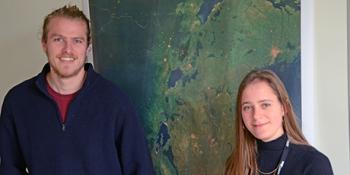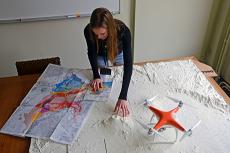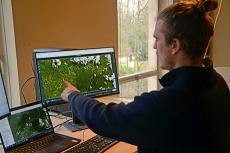Zoom on our two new PhD Researchers...

In July and November 2020, the GeoRiskA team has grown with the arrival of two new PhD researchers: Axel Deijns and Louise Delhaye. Let's quick interview these two new recruits...
Could you introduce yourself?

Louise: "I am a junior researcher at the museum, preparing a PhD. Originally, I obtained a bachelor's degree in geography at the University of Namur, followed by a master's degree in marine and lacustrine sciences at the Universities of Ghent, Antwerp and Brussels. Following an internship that I did here at the museum during my master, I was hired in the framework of the VeRSUS project for a period of one year during which I am perfecting my skills in photogrammetry and remote sensing applied to the study of lava lakes in Kivu. Having lived in Kinshasa (Congo) for four years when I was younger, I always kept a special love for this country and this is what initially pushed me to apply for an internship and then a job at the Royal Museum for Central Africa."
Axel: "I just started my first year of PhD research here at the museum. My research focuses on geomorphic hazards and compound events in Africa, specifically the western branch of the East African rift. Here I develop a multi-sensor remote sensing approach to create an unprecedented landslide and flash flood inventory. This inventory is analyzed for spatial and temporal trends and the interplay of multiple compounding drivers on the occurrence of the geomorphic hazards is assessed. I am originally from the Netherlands where I studied Earth Sciences during my BSc and ‘Earth, surface and water’ with a specific focus on natural hazards and earth-observation during my MSc programme."

What do you like in the work you are doing? What are you most passionate about your research topic?
Axel: "I am highly interested in the development of new tools for detecting and analyzing natural hazards using remote sensing data. The possibility to do this on a large scale in an under-researched area prone to geomorphic hazards is very exciting to me. At the same time, I am very much looking forward to upcoming fieldwork with the team."
Louise: "I like the creative side of research and the fact that I'm always learning something. I also have the opportunity to organize my time and work independently, knowing that I am working to achieve new results and not just because "I have to work". In my case, the results that I produce will hopefully help improve our knowledge of the Nyiragongo lava lake, and that's also what is exciting, knowing that my work is going to be useful not just for me, but for other researchers and for the progress of science in general. Nyiragongo represents a threat for the nearby populations, and I like to know that my work is part of a bigger initiative that helps to better understand its functioning and better assess the volcanic risk. This dimension gives an another more concrete meaning to my work. Regarding photogrammetry and remote sensing in general, what I like about it is the idea of being able to study remote and difficult to access areas. I think that these techniques represent -and will represent even more in the future- a major tool for the study of our planet."
What do you like in the fact that you work at the Africa Museum?
Louise: "Working at the Royal Museum for Central Africa has a lot of advantages. First of all, it's a great place to work (although I haven't had the opportunity to enjoy it much this year). The offices are spacious, the buildings are beautiful and the large adjacent park is a great place to take lunch breaks during summer. It's close to Brussels, yet far enough away to enjoy a quiet place to work and have a quick access to the Forêt de Soignes. The downside of the location is that it is not that easy to access by public transport. The team I have joined is great. Thay have a strong team spirit. They always support each other and the working atmosphere is very positive. In addition, here at the museum, we benefit from an impressive amount of archives that are not available anywhere else, carefully preserved data, books, samples, aerial photos dating from the last century, etc., which are still used in research today, as they provide us with lots of valuable and rare information."
Axel: "I like the fact that the work of the Earth Science department and the GeoRiskA is directly in line with my research interests and allows me to develop myself in it. The colleagues are very helpful and are always in for a discussion."
How do you live the current lockdown that is affecting us all?
Axel: "At minimum 1.5 m from anyone else." (Laugh)
Louise: "I never imagined that I would start my first job with teleworking. It is not necessarily the best way to join a research group and start a new job, but the team I work with has done its best to make me feel part of their group and the regular team meetings keep me positive and motivated despite the circumstances. Of course, teleworking makes life easier in terms of transports and organization of your time, but I'm still looking forward to being able to go back (well, start actually) working at the museum, so I can really integrate the team and have real contacts with my colleagues."
According to you, what are the key advantages of working in a Federal Scientific Institution for your PhD, instead of being solely attached to a university?
Axel: "Probably the fact that with a Federal Scientific Institution it is more geared towards actual implementation which leads to more commitment for a specific area and the people in it."
Louise: "I think that, in a research institute like this one, we are not (only) doing pure and empirical research. What we are studying must have a more concrete relevance (in our case, helping to protect the population against natural hazards). The motivation and, therefore, the state of mind behind the research are different. The objective is more to work together in order to obtain quality data and information to help the populations in the studied region, directly or indirectly."
Would you recommend working with the GeoRiskA team and why?
Axel: "Absolutely! The people are nice, welcoming and can challenge you for a good discussion. If you like researching natural hazards in tropical Africa, I would really recommend it."
Louise: "Yes, absolutely! Because it is a great team, with good cohesion, strong support and good team spirit. But in addition to the super positive and pleasant atmosphere, it is also a team that works hard and scrupulously. Thanks to the experience, expertise and dedication of the team members, young researchers (or even trainees) who are just starting out are well supervised and supported, and learn a lot from their experience at the museum. After only a few months here, I can already see that the work performed by the GeoRiskA team is more than a job. It is a really passion for the researchers."
